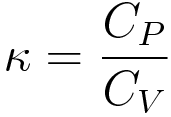Heat Capacity Ratio of Common Fluids
Ratio of specific heats table
| Fluid | Heat Capacity Ratio |
|---|---|
| Acetone | 1.11 |
| Acetylene | 1.24 |
| Air | 1.4 |
| Alcohol (ethanol) | 1.13 |
| Alcohol (methanol) | 1.26 |
| Ammonia | 1.31 |
| Argon | 1.66 |
| Benzene | 1.12 |
| Blast furnace gas | 1.41 |
| Bromine | 1.28 |
| Butane | 1.094 |
| Carbon dioxide | 1.31 |
| Carbon Disulphide | 1.21 |
| Carbon monoxide | 1.4 |
| Chlorine | 1.33 |
| Chlorine | 1.34 |
| Chloroform | 1.15 |
| Ethane | 1.19 |
| Ether (diethyl ether) | 1.03 |
| Ethyle Alcohol | 1.13 |
| Ethyle Chloride | 1.19 |
| Ethylene | 1.24 |
| Helium | 1.66 |
| Hexane | 1.06 |
| Hydrogen | 1.405 |
| Hydrogen chloride | 1.41 |
| Hydrogen sulphide | 1.32 |
| Hydrogene | 1.41 |
| Hydroxyl | 1.384 |
| Iso-butane | 1.19 |
| Iso-octane | 1.05 |
| Iso-pentane | 1.08 |
| Krypton | 1.68 |
| Mercury | 1.67 |
| Methane | 1.32 |
| Methyl Alcohol | 1.2 |
| Methyl butane | 1.08 |
| Methyl Chloride | 1.2 |
| Natural Gas | 1.27 |
| Natural Gas (Methane) | 1.32 |
| N-butane | 1.18 |
| Neon | 1.667 |
| N-heptane | 1.05 |
| Nitric oxide | 1.4 |
| Nitrogen | 1.47 |
| Nitrogen tetroxide | 1.02 |
| Nitrous oxide | 1.31 |
| Oxygen | 1.45 |
| Pentane | 1.07 |
| Propane | 1.13 |
| Propylene | 1.15 |
| R-11 | 1.14 |
| R-114 | 1.09 |
| R-12 | 1.14 |
| R-123 | 1.1 |
| R-134a | 1.2 |
| R-22 | 1.18 |
| Steam (water) | 1.33 |
| Sulphur dioxide | 1.26 |
| Toulene | 1.09 |
| Water vapor | 1.33 |
| Xeon | 1.66 |
| Fluid | Heat Capacity Ratio |
You can share this table through:
How the Heat Capacity Ratio of Common Fluids Table works?
This table presents the absolute viscosity of some common fluids and his evolution against the temperature.
Heat capacity ratio formula
Ratio of the heat capacity at constant pressure (CP) to heat capacity at constant volume (CV). It is sometimes also known as the isentropic expansion factor and is denoted by γ (gamma) for an ideal gas or κ (kappa), the isentropic exponent for a real gas.

Another calculators or articles that may interest you:
- What would be the change in our control system if we made a change in a variable in the process? Here is a useful laboratory where you can test these effects before applying it to the real plant. Very interesting for both instrumentation technicians and engineering students
- This simple and easy Online Length Unit Converter let you convert several types of length units.
- Flow Converter, an easy Flow Unit Conversion Online Tool.
- Density Converter, another of our FREE Online Unit Converter
- Do you need to convert any type of pressure unit? this pressure converter is your tool.
- Temperature Unit Converter easy and useful.
- Visit this practical Viscosity Unit Conversion online tool: Viscosity Converter.
- Absolute Viscosity of Common Gases, is a table that represents the absolute viscosity of some common fluids and his evolution against the temperature.
- Density of Common Liquids, an useful table that represents the density of some common liquids and their temperature.
- Here you ara a complete table with the molecular weigth of common gases, including air, steam and natural gas, and his formula Molecular Weigth of Common Gases
- Don't forget to visit this Thermal Expansion Coefficient Table